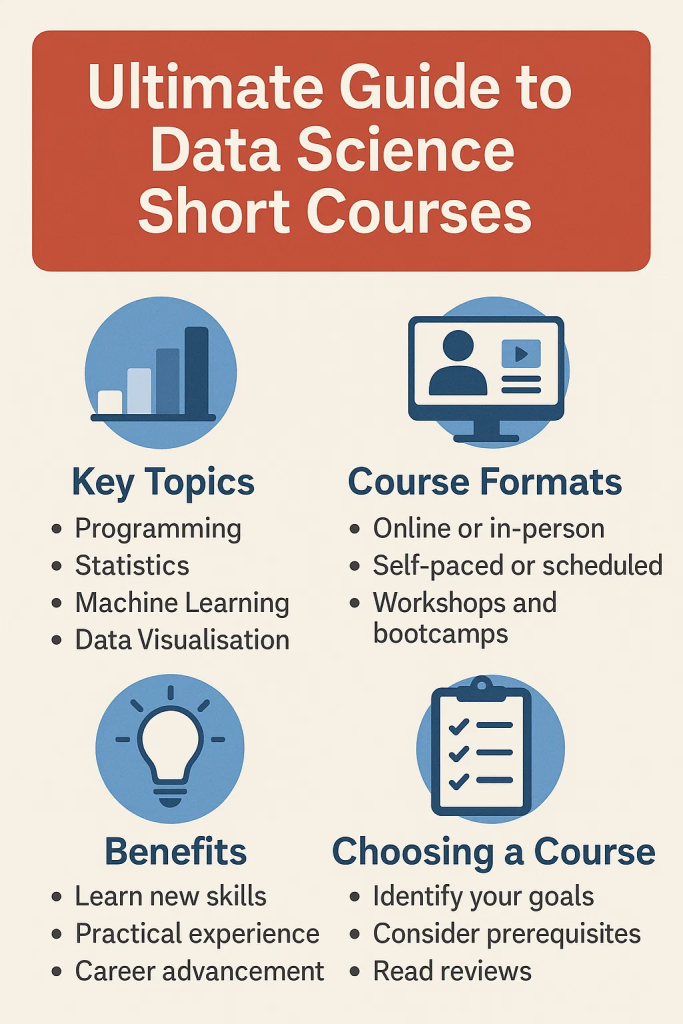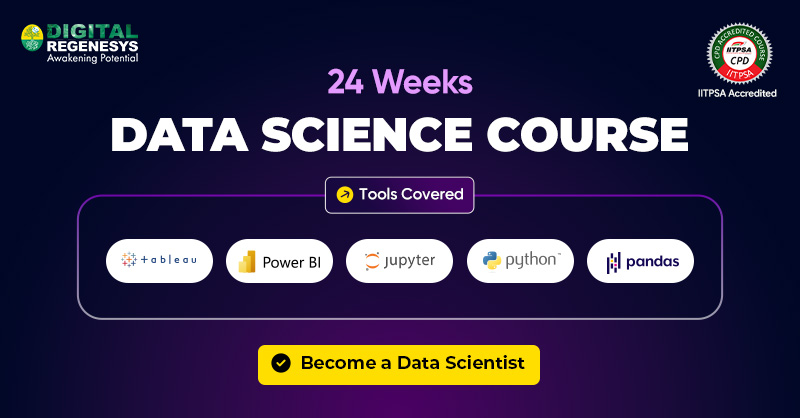Guide to Data Science Short Courses

Data science has emerged as a transformative field that enables organisations to make data-driven decisions, optimise operations, and create business value. With growing demand for skilled professionals, data science short courses have become a practical solution for learners seeking quick, efficient, and affordable training.
These courses teach essential concepts, including Python and R programming, SQL, machine learning, and data visualisation, while offering hands-on experience with real datasets.
They enable professionals to quickly apply their knowledge to solve real-world problems, making them highly employable in today’s competitive market. In this article, we explore the benefits, types, skills gained, and career advantages of data science short courses, helping you choose the right path for your career.

Benefits of Data Science Short Courses
Short courses are ideal for learners who want to quickly gain skills without investing years in formal education. They focus on practical learning rather than theory, enabling participants to apply knowledge immediately.
These courses provide certifications that enhance resumes and demonstrate expertise to employers, offering a tangible career advantage in today’s competitive job market. Learners can also gain confidence in working with complex datasets, explore advanced tools such as Python and Tableau, and understand statistical concepts essential for data-driven decision-making.
Key benefits of these courses include:
- Quick acquisition of practical skills for immediate application.
- Career advancement through certifications and project experience.
- Hands-on learning with real datasets and business scenarios.
- Flexibility to learn online, at your own pace.
- Affordable compared to traditional degree programs.
Know more about Introduction to Data Science.

Types of Data Science Short Courses
Short courses are tailored to learners’ goals and experience. Beginners often start with foundational courses like Python or statistics, while intermediate learners may focus on machine learning or data visualisation.
Advanced learners can explore specialised courses in AI, big data, or cloud-based analytics. Each course is designed to deliver concise, practical knowledge, often including mini-projects or case studies to reinforce learning. Course durations range from three weeks to two months, making them accessible even for busy professionals.
Popular course types include:
- Python for Data Science – Learn Python basics, NumPy, Pandas, and automation.
- Machine Learning Basics – Build predictive models with scikit-learn and ML algorithms.
- Data Visualisation – Create dashboards and reports using Tableau, Power BI, or matplotlib.
- Statistics & Probability – Understand descriptive statistics, regression, and hypothesis testing.
- Big Data Essentials – Work with Hadoop, Spark, and cloud data pipelines.
Skills Gained from Data Science Short Courses
Short courses equip learners with both technical and analytical skills. Technical skills include Python, R, SQL, data manipulation, machine learning algorithms, statistical analysis, and data visualisation tools like Tableau and Power BI.
Analytical skills include problem-solving, critical thinking, interpreting complex datasets, and making data-driven business decisions. Many courses also incorporate hands-on projects that enable learners to build a portfolio of real-world applications, thereby enhancing employability and practical knowledge.
Key skills gained include:
- Programming in Python or R for data analysis.
- Data cleaning, preprocessing, and exploratory analysis.
- Machine learning model development and evaluation.
- Data visualisation and interactive dashboard creation.
- Big data management and cloud-based analytics.
Get insights on Data Science Project Deployment.
How to Choose the Right Short Course
Selecting the right short course requires evaluating your current skill level, career objectives, and learning preferences. Beginners should prioritise foundational courses in Python, statistics, or SQL, while professionals looking to upskill can focus on machine learning, AI, or big data.
Check whether the course provides hands-on projects, real-world datasets, and industry-relevant tools. Consider the duration, platform credibility, instructor expertise, and learner reviews. Selecting courses that align with your goals ensures maximum benefit and relevance for your career.
Factors to consider include:
- Assess your skill level – Beginner, intermediate, or advanced.
- Identify career goals – Career switch, upskilling, or specialisation.
- Evaluate the course content and tools covered.
- Look for hands-on projects to build practical experience.
- Read reviews and check instructor credibility.
Top Platforms Offering Data Science Short Courses
Digital Regenesys offers a comprehensive Data Science Certificate Course designed to equip learners with the practical skills and knowledge needed to excel in the data-driven world. The course is structured to provide hands-on learning with real-world datasets, ensuring students gain both theoretical understanding and practical experience.
Course Details:
- Duration – 30 weeks
- Mode – 100% Online with Live Instructor-Led Sessions
- Certification – Globally Recognised Data Science Certificate
- Eligibility – No prior coding experience required
- Ideal For – Beginners, career switchers, and professionals seeking upskilling
Key Features:
- Expert Mentorship – Learn from industry-experienced instructors.
- Flexible Learning – Access course materials anytime, anywhere.
- Hands-On Projects – Work with real datasets to build a strong portfolio.
- Networking Opportunities – Connect with peers and professionals.
- Career Support – Receive guidance on job placements and career advancement.
Skills and Tools Covered:
- Programming – Python, Anaconda, Jupyter Notebook
- Data Analysis – NumPy, Pandas
- Visualisation – Tableau, Power BI, Seaborn
- Machine Learning – Core algorithms for predictive modelling
With its practical curriculum, real-world projects, and career support, Digital Regenesys provides a complete solution for anyone aiming to build a successful career in data science.
Career Benefits After Completing Short Courses
Short courses provide a clear path to multiple data science roles. Professionals can pursue positions such as data analyst, data scientist, machine learning engineer, or business analyst. Certificates validate skills and enhance resumes, while project experience demonstrates practical knowledge to employers.
Short courses also keep learners updated on industry trends, tools, and best practices. For career switchers, these courses reduce the learning curve, enabling them to enter the data science field more quickly. Even professionals already in tech benefit from upskilling and staying competitive in an evolving job market.
Career advantages include:
- Transition to data analyst, data scientist, or ML engineer roles.
- Improve employability with certifications and projects.
- Stay updated with emerging tools and frameworks.
- Prepare for advanced studies or AI specialisation.
- Demonstrate credibility to potential employers.
Learn why Data Science Certificate Course is essential.
Conclusion
Data science short courses provide a fast, practical, and cost-effective path to building essential skills in programming, statistical analysis, machine learning, and data visualisation. They offer hands-on experience through real-world projects, enabling learners to apply knowledge immediately.
For those seeking to further strengthen their expertise, the Digital Regenesys Data Science Certificate Course can help establish a solid foundation, enhance technical skills, and prepare learners for exciting careers in data analytics and data science.
Boost your career today -visit Digital Regenesys to explore our courses.
Last Updated: 5 November 2025
